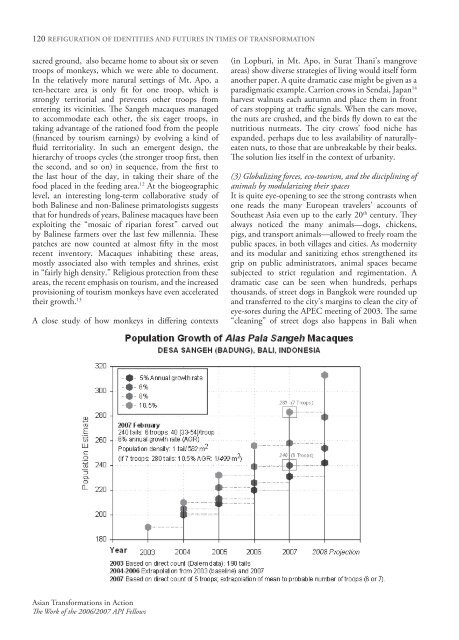Asian Transformations in Action - Api-fellowships.org
Asian Transformations in Action - Api-fellowships.org
Asian Transformations in Action - Api-fellowships.org
You also want an ePaper? Increase the reach of your titles
YUMPU automatically turns print PDFs into web optimized ePapers that Google loves.
120 REFIGURATION OF IDENTITIES AND FUTURES IN TIMES OF TRANSFORMATIONsacred ground, also became home to about six or seventroops of monkeys, which we were able to document.In the relatively more natural sett<strong>in</strong>gs of Mt. Apo, aten-hectare area is only fit for one troop, which isstrongly territorial and prevents other troops fromenter<strong>in</strong>g its vic<strong>in</strong>ities. The Sangeh macaques managedto accommodate each other, the six eager troops, <strong>in</strong>tak<strong>in</strong>g advantage of the rationed food from the people(f<strong>in</strong>anced by tourism earn<strong>in</strong>gs) by evolv<strong>in</strong>g a k<strong>in</strong>d offluid territoriality. In such an emergent design, thehierarchy of troops cycles (the stronger troop first, thenthe second, and so on) <strong>in</strong> sequence, from the first tothe last hour of the day, <strong>in</strong> tak<strong>in</strong>g their share of thefood placed <strong>in</strong> the feed<strong>in</strong>g area. 12 At the biogeographiclevel, an <strong>in</strong>terest<strong>in</strong>g long-term collaborative study ofboth Bal<strong>in</strong>ese and non-Bal<strong>in</strong>ese primatologists suggeststhat for hundreds of years, Bal<strong>in</strong>ese macaques have beenexploit<strong>in</strong>g the “mosaic of riparian forest” carved outby Bal<strong>in</strong>ese farmers over the last few millennia. Thesepatches are now counted at almost fifty <strong>in</strong> the mostrecent <strong>in</strong>ventory. Macaques <strong>in</strong>habit<strong>in</strong>g these areas,mostly associated also with temples and shr<strong>in</strong>es, exist<strong>in</strong> “fairly high density.” Religious protection from theseareas, the recent emphasis on tourism, and the <strong>in</strong>creasedprovision<strong>in</strong>g of tourism monkeys have even acceleratedtheir growth. 13A close study of how monkeys <strong>in</strong> differ<strong>in</strong>g contexts(<strong>in</strong> Lopburi, <strong>in</strong> Mt. Apo, <strong>in</strong> Surat Thani’s mangroveareas) show diverse strategies of liv<strong>in</strong>g would itself formanother paper. A quite dramatic case might be given as aparadigmatic example. Carrion crows <strong>in</strong> Sendai, Japan 14harvest walnuts each autumn and place them <strong>in</strong> frontof cars stopp<strong>in</strong>g at traffic signals. When the cars move,the nuts are crushed, and the birds fly down to eat thenutritious nutmeats. The city crows’ food niche hasexpanded, perhaps due to less availability of naturallyeatennuts, to those that are unbreakable by their beaks.The solution lies itself <strong>in</strong> the context of urbanity.(3) Globaliz<strong>in</strong>g forces, eco-tourism, and the discipl<strong>in</strong><strong>in</strong>g ofanimals by modulariz<strong>in</strong>g their spacesIt is quite eye-open<strong>in</strong>g to see the strong contrasts whenone reads the many European travelers’ accounts ofSoutheast Asia even up to the early 20 th century. Theyalways noticed the many animals—dogs, chickens,pigs, and transport animals—allowed to freely roam thepublic spaces, <strong>in</strong> both villages and cities. As modernityand its modular and sanitiz<strong>in</strong>g ethos strengthened itsgrip on public adm<strong>in</strong>istrators, animal spaces becamesubjected to strict regulation and regimentation. Adramatic case can be seen when hundreds, perhapsthousands, of street dogs <strong>in</strong> Bangkok were rounded upand transferred to the city’s marg<strong>in</strong>s to clean the city ofeye-sores dur<strong>in</strong>g the APEC meet<strong>in</strong>g of 2003. The same“clean<strong>in</strong>g” of street dogs also happens <strong>in</strong> Bali when<strong>Asian</strong> <strong>Transformations</strong> <strong>in</strong> <strong>Action</strong>The Work of the 2006/2007 API Fellows
















